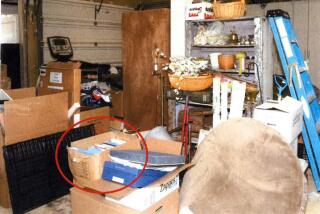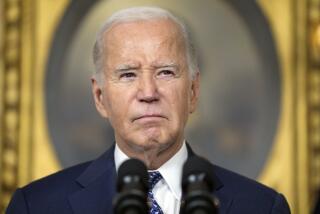Regan Notes Stir Questions on N.Y. Arms Case
The release Thursday of former White House Chief of Staff Donald T. ReganŌĆÖs private notes has raised new questions about a controversial arms conspiracy prosecution pending in New York federal court against a number of international businessmen, including a retired Israeli general and associates of arms financier Adnan Khashoggi.
The Regan notes suggest that some top White House aides may have believed that the alleged $2.5-billion arms deal, for which 17 defendants originally were indicted on 60 counts stemming from alleged arms export violations, was actually being carried out with government knowledge--a position rejected all along by the U.S. attorneyŌĆÖs office.
Notes Show Exchange
However, the notes taken during a Nov. 10, 1986, White House strategy session on the unraveling Iran arms scandal indicate the following exchange:
Vice President George Bush: ŌĆ£Is NY case a private or public endeavor to sell arms to Iran?ŌĆØ
ŌĆ£Ans: Probably private with govŌĆÖt knowledge.ŌĆØ
The source of the response was not clear in ReganŌĆÖs notes, but among those present with the most likely knowledge of the case were National Security Adviser John M. Poindexter and Atty. Gen. Edwin Meese III. The others present were President Reagan, Secretary of State George P. Shultz and Defense Secretary Caspar W. Weinberger.
At the time, federal prosecutors in New York were asserting in court papers that the accused arms conspirators--including former Israeli Brig. Gen. Avraham Bar-Am and Khashoggi associates Samuel Evans of London and Nico Minardos of Los Angeles--had attempted to sell U.S. arms to Iran without official approval.
Assured on Authorization
In those same court documents, the U.S. attorneyŌĆÖs office in New York had assured the court that there was no U.S. policy authorizing any arms sales to Iran in 1985-86, the period when the arms deal was being negotiated.
That declaration, which Meese conceded was false during testimony Wednesday before the joint congressional committees, prompted Sen. Warren B. Rudman (R-N.H.) to express concern that false information was being submitted to the courts by agents of the Department of Justice.
Federal prosecutors got additional bad news about the New York arms case Thursday when U.S. District Judge Leonard Sand dismissed 46 mail and wire fraud counts in the case. Asst. U.S. Atty. Lorna Schofield said a decision to appeal the ruling had not been reached.
More to Read
Sign up for Essential California
The most important California stories and recommendations in your inbox every morning.
You may occasionally receive promotional content from the Los Angeles Times.










